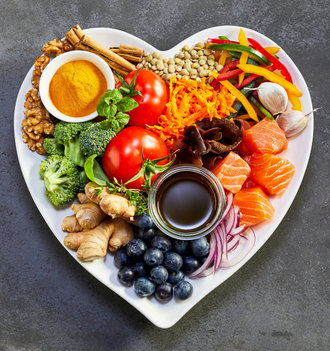Heart Health
Taking care of your heart health does not have to wait until you have heart disease. There are several things you can do today and everyday with the food choices you make to reduce your risk for heart disease.
Focus on Healthy Fats to Manage your Cholesterol.
High levels of LDL or ”bad” cholesterol in your blood can lead to atherosclerosis-fatty deposits that build up inside your arteries. If the arteries leading to or inside your heart become clogged by these deposits, the result can be heart disease.
Simple ways to add good fats:
Fatty Fish: Salmon, Mackerel, Artic char, trout and sardines contain omega 3 fats that help lower LDL cholesterol, reduce inflammation, and prevent platelet aggregation.
Use tinned salmon for a salmon sandwich instead of ham. Make salmon fillet burgers instead of regular ground beef.
Peanuts, nuts and seeds: Peanuts are a super food when it comes to heart health. Peanuts are high in monounsaturated fats which help lower LDL cholesterol and increase HDL. They also contain antioxidants such as Vitamin E and polyphenols that help protect cells from free radical damage. Peanuts contain fibre and minerals such as potassium and magnesium which help lower blood pressure. Eat peanuts several times per week.
Research published in the New England Journal of Medicine found that eating nuts daily can reduce death from heart disease by 29%
Have peanut butter on toast for breakfast or Peanut Fried Rice for dinner. More recipes like this at www.peanutinstitute.com.
Olive oil and Avocado:
Both excellent sources of monounsaturated fats which help lower LDL and increase HDL cholesterol. Use olive oil in place of hard fats for cooking and in salad dressings and marinades. Use avocado on toast in place of mayo or butter.
Fibre: 5-10g of Soluble Fibre per day can lower LDL cholesterol by preventing its’ absorption into the blood stream in the digestive tract.
Oats, barley, and psyllium: Excellent sources of soluble fibre which help reduce LDL cholesterol. Add barley to soups, psyllium to smoothies and eat oatmeal for breakfast.
Beans, lentils, and chickpeas: Contain soluble fibre and insoluble fibre and are low in fat.
Toss lentils into a prepared soup, hummus as a dip for raw vegetables or make a Mediterranean grain medley with lentils. Recipe at www.peanutinstitute.com
Berries, leafy greens, orange vegetables: All are sources of fibre, and antioxidants such as polyphenols and flavonoids which help prevent free radical damage to blood vessels, reducing cardiovascular disease risk.
Cover ½ your plate with fruit and vegetables at lunch and dinner.
Foods high in saturated fats, trans fats, and refined sugars may increase LDL cholesterol and should be limited. If you follow the 80/20 - Rule, keep them as part of your 20%.
Bacon, Sausages, Ribs, chicken skin: High in saturated fats which increase LDL cholesterol.
Cookies, pastries, deep fried foods: May contain lard or trans fats. Both increase LDL cholesterol. Note: by law if a food contains less than 0.5g trans fat per serving manufacturers can say it is 0 trans fat but if you eat more than 1 serving you may be getting a significant amount. Read your food label and ingredient list and avoid products made with hydrogenated vegetable oil or vegetable oil shortening.
Sugar: excess refined sugar may increase LDL cholesterol and decrease HDL cholesterol. In addition, a diet high in sugar increases triglycerides, another risk factor for heart disease.
There are other modifiable risk factors for heart disease you can also address, such as quitting smoking, achieving and maintaining a healthy body weight, being regularly active and reducing your stress.















